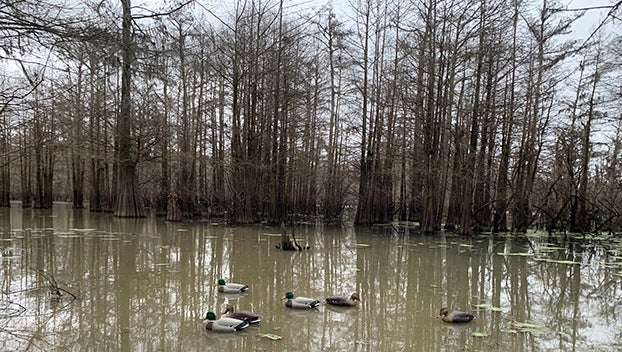Mississippi’s duck, dove seasons will see changes
Published 10:05 am Saturday, April 27, 2024

- Duck decoys on Gillard Lake at St. Catherine Creek National Wildlife Refuge in the Sibley Unit. (Hunter Cloud | The Natchez Democrat)
|
Getting your Trinity Audio player ready...
|
JACKSON — Mississippi Department of Wildlife, Fisheries and Parks commissioners voted to accept the waterfowl program proposals for new season dates. The most significant changes are duck season will have two splits this year instead of three and the dove season will change.
Splits is the term used to describe the breaking up of the migratory bird seasons. Mississippi used three segments for the duck season last year to take advantage of weekends, holidays and to stay within federal season frameworks.
Houston Havens, waterfowl program coordinator, said they used the same criteria this year and due to Thanksgiving falling on Nov. 28, the 2024-25 duck season will have two splits. The first split is Nov. 28 through Dec. 1 and the second split is Dec. 7 through Jan. 31.
“January 31 is the latest allowed by federal frameworks. Our season goes the full 60 days,” Havens said. “Most hunters have requested the season to go the latest it can go and Thanksgiving weekend is the typical opener. The way Thanksgiving fell changed things a little bit.”
Youth, Veteran and Active Military will have a special duck hunting season on February 8 and 9.
Dove season change
Havens requested the commission change the dove season opener for the North Mississippi zone. The north Mississippi dove zone is defined as areas north of US84 plus areas south of US84 but west of MS 35. The south Mississippi dove zone is defined as areas south of US84 and east of MS35.
Hunting clubs have requested a few times for some changes to be made to the dove season. It is not a significant change and really only changes the second and third splits of the dove season.
Commissioners approved the north zone dates to be changed to Sept. 1 through Sept 29, Oct. 12 through Nov. 10 and Dec. 27 through Jan. 26. Opening day of dove season will be on a Sunday.
“This uses the 90 days maximum allowed under federal frameworks. We tried to split them and maximize the weekend opportunities,” Havens said. “Last time the opening day of Dove season fell on a Sunday the commission still used Sept. 1 as the opener. We realize this is the same season used in the south zone. We could list this as a statewide season in the regulations.”
Havens reminded commissioners the zones would still be separate if they ever wanted to go back to different dates for the specific zones.
Other hunting seasons
The September Canada Goose season will open Sept. 1 and run until Sept. 30 as normal. Early Teal season will run from Sept. 14 to Sept. 29.
Rails and Gallinules will open Sept. 1 to Sept. 30 and Nov. 22 to December 31. Snipe season will be open Nov. 14 to February 28. Woodcock season is from Dec. 18 to Jan. 31.
Regular goose seasons will be Nov. 11 to Nov. 24, Nov. 28 to Dec. 1 and Dec. 7 to Jan. 31. Havens said the goose season has more days allowed under the federal law than duck season and the department tries to overlap the goose dates first with duck season dates. The MDWFP then tacks on the rest of the goose season dates to the front of the season.
Crow season, which is set by state statute, will run from Nov. 2 to February 28. Light goose conservation order sets dates from October to March which do not fall on waterfowl seasons. Light geese can be hunted from Oct. 1 to Nov. 10, Nov. 25 to Nov. 27, Dec. 2 to Dec. 6, Feb. 1 to Feb. 7 and Feb. 10 to March 31.
Havens said all of the season dates were selected based on survey data collected in may. The United States Fish and Wildlife Service looks at breeding numbers and breeding habitat and produces a report each summer from the prairie pothole region. A majority of Mississippi’s ducks come from the prairie pothole region in central Canada, North Dakota and South Dakota.
“We have seen overall decline, mallards in particular, but we are hopeful the decline will not continue,” Havens said. “Benchmarks are within the system should we have a continued decline to where we would have to shorten the season and reduce bag limits. We are not there yet and hopefully won’t be. We will pay attention to those surveys as they are implemented and data is released.”






